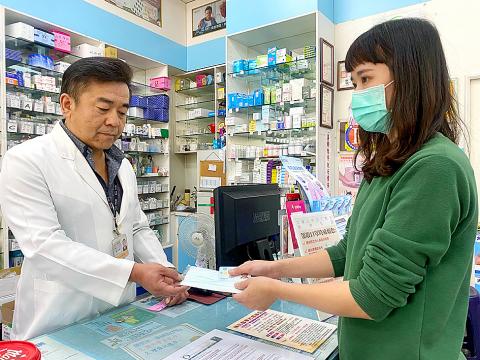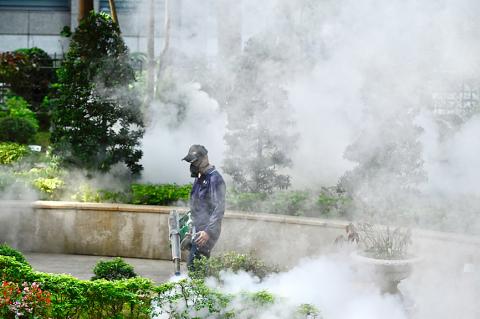The Central Epidemic Command Center (CECC) announced yesterday that it is testing an online system for buying masks using National Health Insurance (NHI) cards, while no new cases of COVID-19 were reported for a third consecutive day.
Minister of Health and Welfare Chen Shih-chung (陳時中), head of the center, was asked to elaborate on Premier Su Tseng-chang’s (蘇貞昌) remark earlier in the day that people could be allowed to order masks online and collect them at convenience stores, and he confirmed that such a program was in the works.
The system was being “pressure-tested” yesterday in a bid to prevent a crash if too many people tried to log on at the same time, Chen said.

Photo: Chang Tsung-chiu, Taipei Times
If the test went smoothly, the center would likely announce details of the plan today, he said.
He said the number of COVID-19 cases in Taiwan remained at 45, including 15 people who have been discharged from hospital.
The Executive Yuan banned mask exports on Jan. 23, began the requisition of masks on Jan. 31 and on Feb. 6 launched a policy requiring people to purchase masks with National Health Insurance (NHI) cards — currently three masks every seven days for adults and five masks every seven days for children.

Photo: Sam Yeh / AFP
However, an online option was proposed to help people who work during the day and cannot line up to buy masks at NHI-connected pharmacies, Chen said.
Using convenience stores for collecting online mask orders was one of the options being considered, he said.
Since the mask rationing policy was launched, the most masks purchased have been for children aged five to 15, and people aged 65 and older, he said.
Centers for Disease Control (CDC) Deputy Director-General Philip Lo (羅一鈞) said that details, such as whether people would have to insert their NHI card into a card reader to order masks online, are being discussed.
The CECC is continuing to supply healthcare facilities with masks, N95 respirators and protective clothing, bringing their inventory levels up to a safe level of 35 days, and 580,000 masks would be allocated by local health departments to social welfare, long-term care and mental health facilities every week, Lo said.
A daily supply of about 700,000 masks for certain sectors, such as the taxi and airline industries, and pharmaceutical factories, would also be increased to about 800,000 masks per day, allocated by the Ministry of Economic Affairs, he said.
Masks for students at special education schools would be allocated by the Ministry of Education, he added.
In related news, Taipei Deputy Mayor Vivian Huang (黃珊珊) said that the Taipei MRT metropolitan rail system is to expand its ban on passengers with high temperatures to five more stations by the end of this month.
Infrared thermometers would screen people’s temperatures before they enter the stations, and if they measure more than 37.5?C, MRT employees would take the temperature again with an ear thermometer, Huang said.
Anyone with a temperature of more than 38?C would be barred from entering the station, while those with a temperature of 37.5?C to 38?C would be advised to wear a mask, she added.
The policy, which has been in effect at Taipei Main Station since Feb. 29, would be rolled out at Ximen Station, Banqiao Station, Taipei City Hall Station, Longshan Temple Station and Zhongxiao Fuxing Station, Taipei Rapid Transit Co employee Ling Chi-yao (凌啟堯) said.
Sixteen infrared thermometers will be set up at the six stations, in addition to the one in use at Taipei Main Station, Ling said.
Additional reporting by CNA

NATIONAL SECURITY THREAT: An official said that Guan Guan’s comments had gone beyond the threshold of free speech, as she advocated for the destruction of the ROC China-born media influencer Guan Guan’s (關關) residency permit has been revoked for repeatedly posting pro-China content that threatens national security, the National Immigration Agency said yesterday. Guan Guan has said many controversial things in her videos posted to Douyin (抖音), including “the red flag will soon be painted all over Taiwan” and “Taiwan is an inseparable part of China,” while expressing hope for expedited “reunification.” The agency received multiple reports alleging that Guan Guan had advocated for armed reunification last year. After investigating, the agency last month issued a notice requiring her to appear and account for her actions. Guan Guan appeared as required,

A strong cold air mass is expected to arrive tonight, bringing a change in weather and a drop in temperature, the Central Weather Administration (CWA) said. The coldest time would be early on Thursday morning, with temperatures in some areas dipping as low as 8°C, it said. Daytime highs yesterday were 22°C to 24°C in northern and eastern Taiwan, and about 25°C to 28°C in the central and southern regions, it said. However, nighttime lows would dip to about 15°C to 16°C in central and northern Taiwan as well as the northeast, and 17°C to 19°C elsewhere, it said. Tropical Storm Nokaen, currently

PAPERS, PLEASE: The gang exploited the high value of the passports, selling them at inflated prices to Chinese buyers, who would treat them as ‘invisibility cloaks’ The Yilan District Court has handed four members of a syndicate prison terms ranging from one year and two months to two years and two months for their involvement in a scheme to purchase Taiwanese passports and resell them abroad at a massive markup. A Chinese human smuggling syndicate purchased Taiwanese passports through local criminal networks, exploiting the passports’ visa-free travel privileges to turn a profit of more than 20 times the original price, the court said. Such criminal organizations enable people to impersonate Taiwanese when entering and exiting Taiwan and other countries, undermining social order and the credibility of the nation’s

‘NATO-PLUS’: ‘Our strategic partners in the Indo-Pacific are facing increasing aggression by the Chinese Communist Party,’ US Representative Rob Wittman said The US House of Representatives on Monday released its version of the Consolidated Appropriations Act, which includes US$1.15 billion to support security cooperation with Taiwan. The omnibus act, covering US$1.2 trillion of spending, allocates US$1 billion for the Taiwan Security Cooperation Initiative, as well as US$150 million for the replacement of defense articles and reimbursement of defense services provided to Taiwan. The fund allocations were based on the US National Defense Authorization Act for fiscal 2026 that was passed by the US Congress last month and authorized up to US$1 billion to the US Defense Security Cooperation Agency in support of the